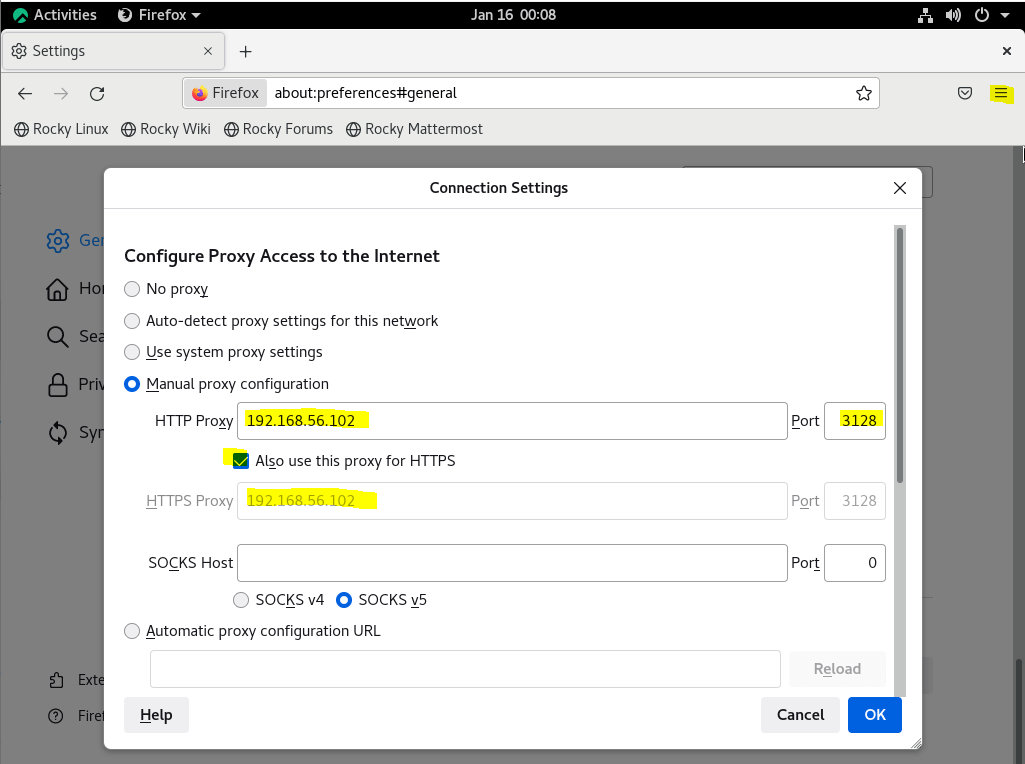Table of Contents
Introduction
Squid is an open-source piece of software used to set up a caching proxy server in any nix servers, It reduces our bandwidth utilization by caching frequently used web contents. It falls under the GNU GPL license, the first stable version released by 20 Mar 2001, and the current latest stable version is 5.3. The version 6 development is in progress and soon we can expect the release.
The virtual machine we are using in the guide has two interfaces. We will focus on the 192.168.56.0/24 network.
[root@squid ~]# ip add | grep -v 'inet6\|127' | grep inet
inet 10.0.2.16/24 brd 10.0.2.255 scope global noprefixroute enp0s3
inet 192.168.56.102/24 brd 192.168.56.255 scope global noprefixroute enp0s8
[root@squid ~]#Installing Squid
App-stream provides squid, check for a guide if you are not familiar with AppStream.
[root@squid ~]# dnf module list squid
Last metadata expiration check: 1:24:02 ago on Sat 15 Jan 2022 08:44:38 PM +04.
Rocky Linux 8 - AppStream
Name Stream Profiles Summary
squid 4 [d] common [d] Squid - Optimising Web Delivery
Hint: [d]efault, [e]nabled, [x]disabled, [i]nstalled
[root@squid ~]#
Let’s start installing the package to set up our caching proxy server.
# dnf module install squid -yIt may take a few seconds to pull the required dependencies.
Installed:
libecap-1.0.1-2.module+el8.4.0+404+316a0dc5.x86_64 libtool-ltdl-2.4.6-25.el8.x86_64 perl-Carp-1.42-396.el8.noarch
perl-DBI-1.641-3.module+el8.4.0+509+59a8d9b3.x86_64 perl-Data-Dumper-2.167-399.el8.x86_64 perl-Digest-1.17-395.el8.noarch
perl-Digest-MD5-2.55-396.el8.x86_64 perl-Digest-SHA-1:6.02-1.el8.x86_64 perl-Encode-4:2.97-3.el8.x86_64
perl-Errno-1.28-420.el8.x86_64 perl-Exporter-5.72-396.el8.noarch perl-File-Path-2.15-2.el8.noarch
perl-File-Temp-0.230.600-1.el8.noarch perl-Getopt-Long-1:2.50-4.el8.noarch perl-HTTP-Tiny-0.074-1.el8.noarch
perl-IO-1.38-420.el8.x86_64 perl-IO-Socket-IP-0.39-5.el8.noarch perl-IO-Socket-SSL-2.066-4.module+el8.4.0+512+d4f0fc54.noarch
perl-MIME-Base64-3.15-396.el8.x86_64 perl-Math-BigInt-1:1.9998.11-7.el8.noarch perl-Math-Complex-1.59-420.el8.noarch
perl-Mozilla-CA-20160104-7.module+el8.4.0+529+e3b3e624.noarch perl-Net-SSLeay-1.88-1.module+el8.4.0+512+d4f0fc54.x86_64 perl-PathTools-3.74-1.el8.x86_64
perl-Pod-Escapes-1:1.07-395.el8.noarch perl-Pod-Perldoc-3.28-396.el8.noarch perl-Pod-Simple-1:3.35-395.el8.noarch
perl-Pod-Usage-4:1.69-395.el8.noarch perl-Scalar-List-Utils-3:1.49-2.el8.x86_64 perl-Socket-4:2.027-3.el8.x86_64
perl-Storable-1:3.11-3.el8.x86_64 perl-Term-ANSIColor-4.06-396.el8.noarch perl-Term-Cap-1.17-395.el8.noarch
perl-Text-ParseWords-3.30-395.el8.noarch perl-Text-Tabs+Wrap-2013.0523-395.el8.noarch perl-Time-Local-1:1.280-1.el8.noarch
perl-URI-1.73-3.el8.noarch perl-Unicode-Normalize-1.25-396.el8.x86_64 perl-constant-1.33-396.el8.noarch
perl-interpreter-4:5.26.3-420.el8.x86_64 perl-libnet-3.11-3.el8.noarch perl-libs-4:5.26.3-420.el8.x86_64
perl-macros-4:5.26.3-420.el8.x86_64 perl-parent-1:0.237-1.el8.noarch perl-podlators-4.11-1.el8.noarch
perl-threads-1:2.21-2.el8.x86_64 perl-threads-shared-1.58-2.el8.x86_64 squid-7:4.15-1.module+el8.5.0+705+218dec94.x86_64
Complete!
[root@squid ~]#Configuring Caching Proxy Server
The configuration file will be residing under /etc/squid/
Let’s make the required changes.
# vim /etc/squid/squid.confThe lines we are interested in are very few.
For which network/Interface does the browsing need to be allowed.
acl linuxsysadmins.local src 192.168.56.0/24Allowing access from our local networks
http_access allow linuxsysadmins.localThe default port of Squid.
http_port 3128If any other port is used instead of 3128 it should be labeled with squid_port_t, for more information refer SELinux guide.
The caching directory to be used by Squid, By default, it will be commented with “#” we need to uncomment.
cache_dir ufs /var/spool/squid 100 16 256The disk space allowed for caching is 100 MB and 16 subdirectories and 256 subdirectories inside those 16 subdirectories.
Save and exit using “wq!“, These are the basic setup and we are good with starting using the Squid.
Starting Squid
Start the service and enable it persistently
# systemctl enable squid.service
# systemctl start squid.serviceNow the service should be up and running.
[root@squid ~]# systemctl status squid.service
● squid.service - Squid caching proxy
Loaded: loaded (/usr/lib/systemd/system/squid.service; enabled; vendor preset: disabled)
Active: active (running) since Sat 2022-01-15 22:58:20 +04; 15s ago
Docs: man:squid(8)
Process: 4241 ExecStartPre=/usr/libexec/squid/cache_swap.sh (code=exited, status=0/SUCCESS)
Main PID: 4248 (squid)
Tasks: 4 (limit: 4862)
Memory: 19.7M
CGroup: /system.slice/squid.service
├─4248 /usr/sbin/squid --foreground -f /etc/squid/squid.conf
├─4250 (squid-1) --kid squid-1 --foreground -f /etc/squid/squid.conf
├─4251 (logfile-daemon) /var/log/squid/access.log
└─4252 (unlinkd)
Jan 15 22:58:19 squid.linuxsysadmins.local systemd[1]: Starting Squid caching proxy...
Jan 15 22:58:19 squid.linuxsysadmins.local cache_swap.sh[4241]: init_cache_dir /var/spool/squid...
Jan 15 22:58:19 squid.linuxsysadmins.local squid[4248]: Squid Parent: will start 1 kids
Jan 15 22:58:19 squid.linuxsysadmins.local squid[4248]: Squid Parent: (squid-1) process 4250 started
Jan 15 22:58:20 squid.linuxsysadmins.local systemd[1]: Started Squid caching proxy.
[root@squid ~]#
Firewall Requirement
Allow the squid port for the clients
# firewall-cmd --add-service=squid --permanent
# firewall-cmd --reload
# firewall-cmd --list-allThat’s it on the server-side.
Client Side Configuration
One of the Linux desktops we are using as our client. The client-side configuration is very simple, just need to add the IP and Port of Squid server. The client we are supposed to use is Mozilla.

To verify and confirm whether Squid works on clients, check for the logs.
Below are a few logs related to Squid.
/var/log/squid/squid.out
/var/log/squid/cache.log
/var/log/squid/access.logTry to access any website and check for the access logs on the Squid server.
# tail -f /var/log/squid/access.logThat’s it, we have completed setting up a basic caching proxy server using Squid.
Conclusion:
By installing and configuring a basic configuration the squid caching proxy server is ready to serve the internet for any client. Subscribe to the newsletters and provide your feedback through below comment section.